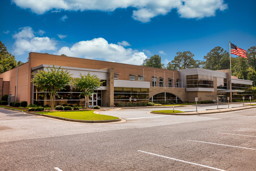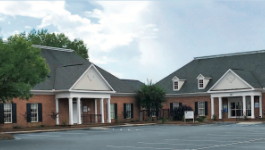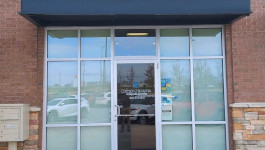Rotator Cuff Injuries in the Workplace – Dr. Matthew Toth

Shoulder injuries are a common occurrence in the workplace. The shoulder joint is one of the most mobile joints in the body and therefore undergoes a tremendous amount of stress and force throughout the normal range of motion. Of these injuries to the shoulder, one of the most common is an injury to the rotator cuff, particularly tears of the rotator cuff. Without proper diagnosis and treatment, rotator cuff tears can lead to significant disability, cost, and loss of productivity.
How Does the Rotator Cuff Work?
The rotator cuff is made up of four distinct muscles: the supraspinatus, infraspinatus, subscapularis, and teres minor. Each of these muscles plays a distinct role in providing stability to the shoulder joint throughout range of motion and the movement of the arm. These four muscles insert onto different aspects of the humeral head. It is typically at these insertion sites where injuries occur. There is a spectrum of damage that can occur to the rotator cuff, from tendinitis and partial tears to complete, full thickness tears with retraction and atrophy of the muscle.
How are Rotator Cuff Injuries Diagnosed?
Initial evaluation of the patient with a suspected rotator cuff injury is crucial in helping to make the correct diagnosis. The mechanism of injury is particularly important, as rotator cuff tears can occur when lifting heavy objects, especially overhead, as well as with falls onto the shoulder and dislocations of the shoulder joint in patients over the age of 40. Patients will typically complain of pain and weakness when trying to lift the affected arm, lateral pain around the shoulder, and pain at night.
Physical Examination
A thorough physical exam of the shoulder helps to supplement the history of the injury. Muscle strength and range of motion are particularly important to evaluate. The patient may have a difference in active range of motion (when the patient is moving their arm at the shoulder themselves) compared to passive range of motion (when the clinician is moving the arm at the shoulder) as well as weakness with internal rotation, external rotation, and abduction of the shoulder. Patients will often be tender to palpation along the lateral rotator cuff insertion at the humeral head.
Imaging Tests
While the history and physical exam are the most crucial pieces of evidence in evaluating a patient with a possible rotator cuff injury, imaging studies are also a valuable tool in making the correct diagnosis and getting the best treatment for the patient. X-rays are typically obtained at the initial evaluation to rule out any abnormal anatomy or fractures. X-rays may demonstrate cysts in the greater tuberosity of the humeral head. MRI can help confirm clinical suspicion of a rotator cuff injury, demonstrating rotator cuff tendinopathy or tearing of the rotator cuff. The interpretation of these studies in addition to the history and physical exam is crucial for making the diagnosis and getting the patient the correct treatment.
How are Rotator Cuff Injuries Treated in Central GA?
Treatment of rotator cuff injuries varies depending on the pathology. Tendinitis and partial rotator cuff tears can initially be managed non-operatively with physical therapy, anti-inflammatory medications, and subacromial steroid injections. Failure of conservative management is subsequently treated with surgery, typically with either debridement of the tendon or repair of the partial tear, either through minimally invasive arthroscopic or open techniques.
Full thickness rotator cuff tears should be managed operatively with repair of the tendon to its insertion, again through arthroscopic or open techniques. Full thickness tears that are not repaired can lead to retraction of the tendon and subsequent atrophy of the muscle, leading to subsequent shoulder weakness and dysfunction. Tears of multiple rotator cuff tendons and tears with significant retraction, or “massive” tears, are often more difficult to repair and have worse outcomes. Additionally, massive irreparable rotator cuff tears often lead to shoulder arthritis, or rotator cuff arthropathy. In these cases, degradation of the cartilage of the shoulder joint from lack of stabilization leads to stiffness and pain. These patients often require surgical management with a special kind of shoulder replacement called a reverse total shoulder arthroplasty, which puts limitations on the amount of stress that can be placed on the shoulder through activities such as lifting.
About Dr. Matthew Toth
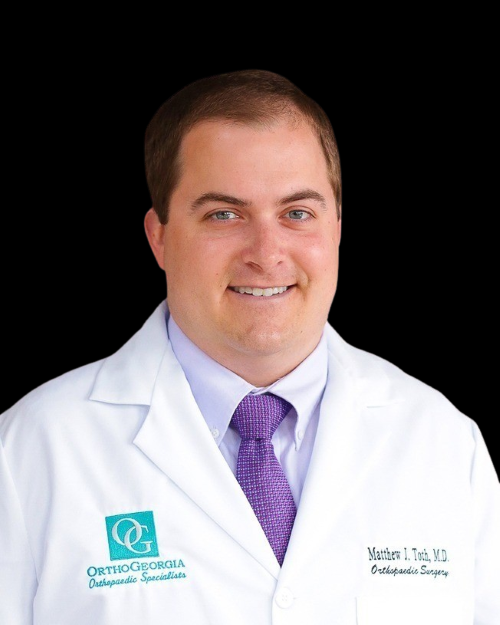
Dr. Matthew Toth is a fellowship-trained sports medicine specialist at OrthoGeorgia who also specializes in total joint care. He has a particular interest in arthroscopic treatment of the shoulder, elbow, hip, knee, and ankle, as well as joint replacement of the shoulder, hip, and knee. He is a member of the American Academy of Orthopaedic Surgeons, the American Orthopaedic Society for Sports Medicine, and the Arthroscopy Association of North America and has worked with athletes at all levels in Georgia and beyond. Dr. Toth meets with patients at our office in Milledgeville, GA.
Comprehensive Workers’ Compensation Program in Central Georgia
Although workplace injuries to the rotator cuff are common and can affect patients to varying degrees, they can lead to significant pain, dysfunction, and cost. Prompt recognition of these injuries is crucial to restoring normal function and getting patients back to work. At OrthoGeorgia, we are proud to offer our patients access to comprehensive workers’ compensation services, with our program focused on access, communication, and consistency. Our specialists are trained to evaluate and treat injured workers via compassionate orthopaedic care. We specialize in the treatment of the spine, neck, hand, knee, hip, shoulder, and foot & ankle, including total joint replacement in Central GA. To learn more about our physicians, specialties, and the care we provide, or to schedule an appointment with OrthoGeorgia, please contact the orthopaedic clinic nearest you today.
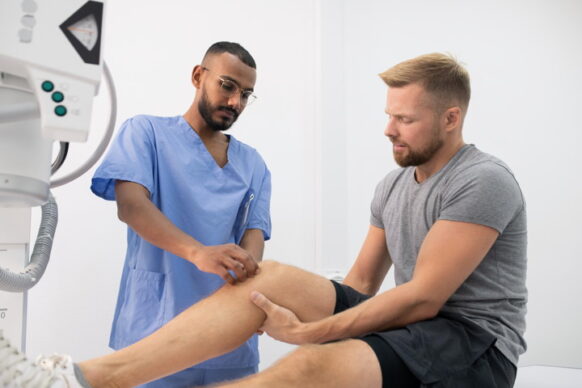
Personalized Orthopaedic Care in Central Georgia
At OrthoGeorgia, we want to help you live a healthier and more comfortable life by giving those in Macon, Warner Robins, Kathleen, Milledgeville, Dublin, Hawkinsville, and the surrounding areas convenient access to the highest quality care. Whether you have been suffering from a sports injury or a common orthopaedic condition, we will determine the cause of your discomfort and craft a personalized treatment plan to bring you relief. To learn more about our services and our physicians, or to schedule an appointment at OrthoGeorgia, please contact us today.
